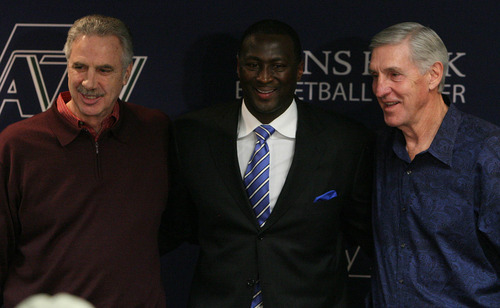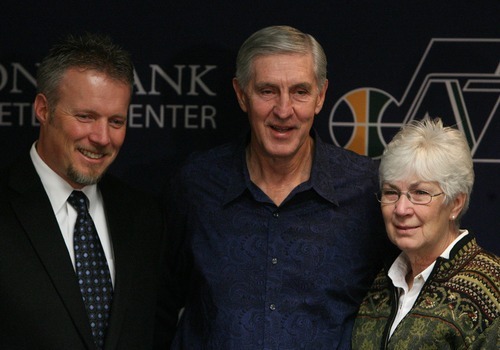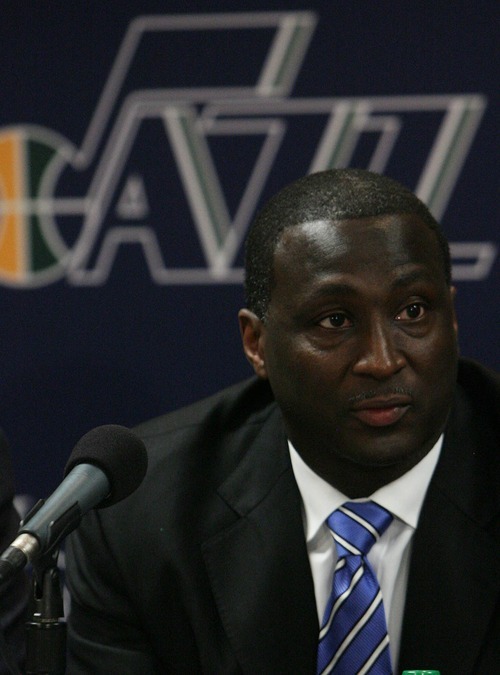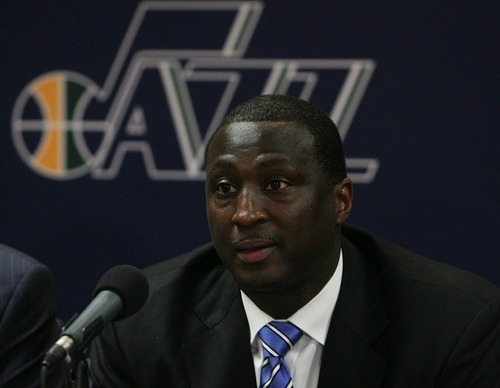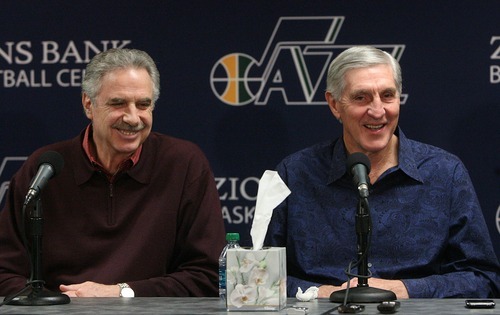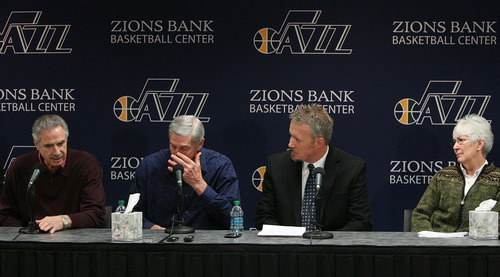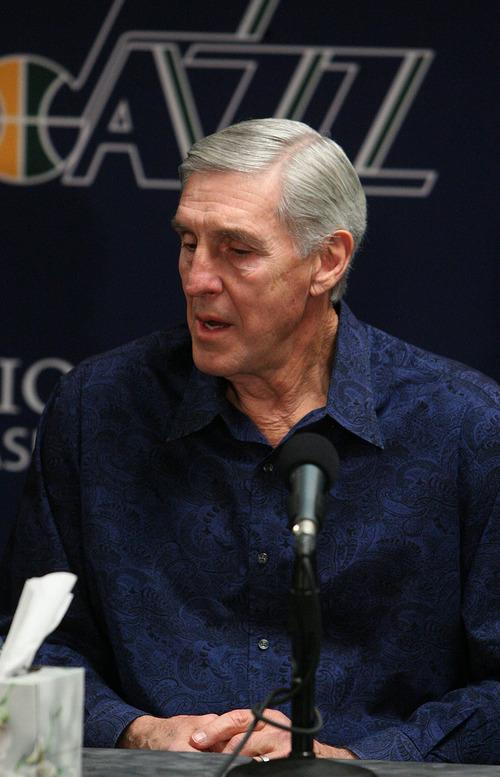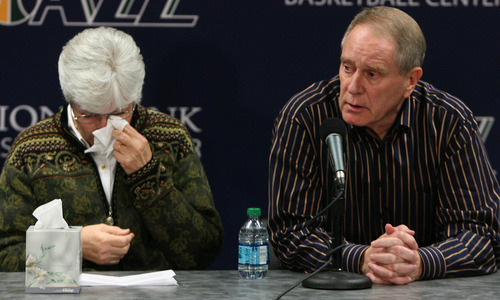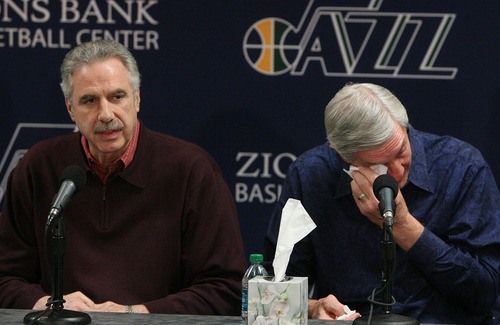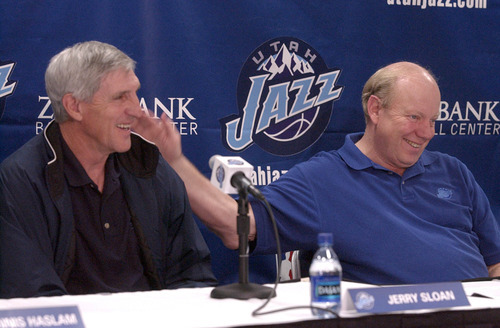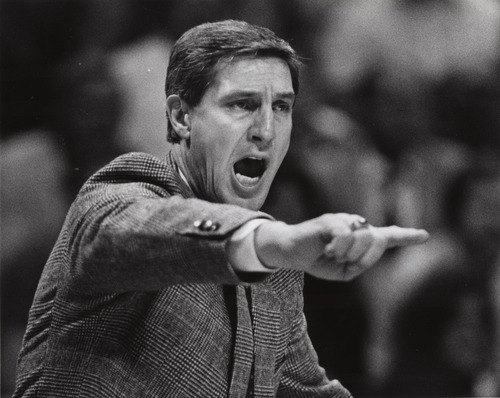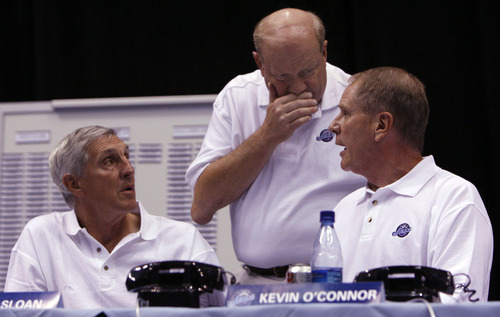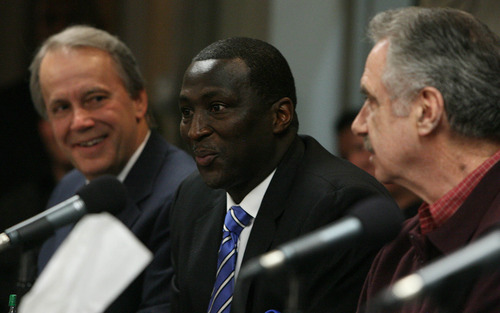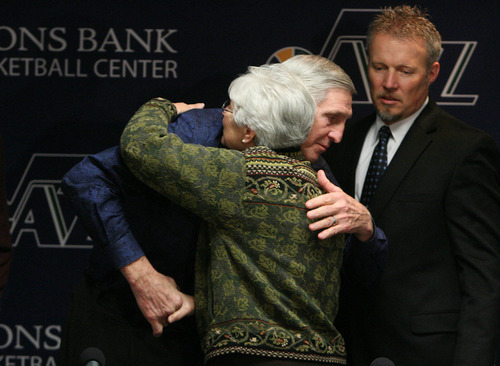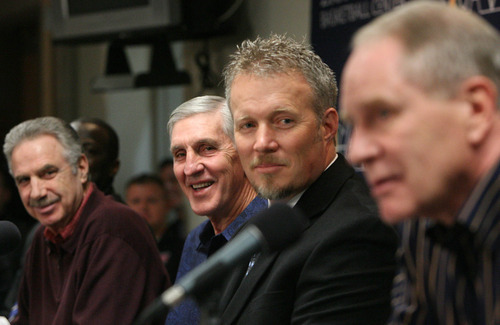This is an archived article that was published on sltrib.com in 2011, and information in the article may be outdated. It is provided only for personal research purposes and may not be reprinted.
After long hinting that he might wake up one day and suddenly decide to leave behind the sport he had put nearly his entire life into, Jerry Sloan did just that Thursday.
News that Sloan — and his longtime friend and assistant coach, Phil Johnson — were quitting first emerged early Thursday, after a Wednesday night home loss to the Chicago Bulls that featured an unusual closed-door postgame meeting that included Sloan, General Manager Kevin O'Connor and team owner Greg Miller. By midafternoon, the 68-year-old Sloan announced his resignation at an emotional news conference at the Jazz's practice facility.
Fighting back tears and choking up several times, the Hall of Fame coach, who ranks No. 3 on the NBA's all-time wins list with 1,221 career victories, acknowledged that publicly giving up basketball was much more difficult than he imagined.
But after contemplating the idea during the days leading up to his decision, the only head coach Utah has known since 1988 knew that his 28-year run with the family owned, small-market organization had finally come to an end.
"I've been blessed," said Sloan, who served as a head coach, assistant and scout with the Jazz. "Today's a new day. I'll get this over with, and I know I'm going to feel much better."
Sloan ended his 45 years in the NBA as the longest-tenured coach in professional sports. He guided Utah to 17 consecutive winning seasons (1988-2004), 20 playoff appearances, seven division titles and two NBA Finals appearances.
Sloan leaves the game having never won an NBA title or being named Coach of the Year. But he also walks away with no regrets.
"When it was all said and done, it was just a matter of me deciding it was time for me to leave," Sloan said. "Not make a big deal out of that. I try not to make a big deal out of most things, anyway."
Johnson's career has long been tied to that of Sloan. He served 23 years as Sloan's assistant, and also coached Sloan when he was with the Chicago Bulls.
Johnson acknowledged the obvious Thursday: Once Sloan left, he was gone, too.
"It's an experience that not many people have because we have been here for such a long time," Johnson said. "So many relationships get built over that time. In this business, you can be someplace for two years and be gone. Very few relationships are built through the press, the fans, the ownership and the people you work with. … Most of all, I'm thankful for Jerry Sloan."
Seventh-year assistant Tyrone Corbin was immediately named as Sloan's replacement. He has yet to sign a contract with the team, and his ability to move an inconsistent 31-23 squad forward — one that has gone from exceeding initial expectations to suddenly fighting for a Western Conference playoff spot — is expected to be evaluated at the end of the season.
However, the former Jazzman and 16-year NBA player has a strong relationship with many of the athletes whom he will now lead. He is also viewed by key members of the organization as a strong symbol of a fresh start after relations between Sloan and his players — particularly All-Star point guard Deron Williams — had deteriorated.
"It's a great opportunity for guys to rally around the moment of the change. It's a new slate for everybody," Corbin said. "We'll just go from where we are. There's no history with me as a head coach and them as my players. So they are players for the Utah Jazz, but I am a different guy."
A lengthy postgame discussion Wednesday involving Sloan, O'Connor and Miller — one that followed Utah's tough 91-86 home loss to the Bulls — was the tipping point in Sloan's decision. But Sloan, who coached one of the league's all-time duos in John Stockton and Karl Malone and constantly balanced an overwhelming devotion to the game with a simple love of quiet farm life, had struggled throughout the season. On Thursday, he acknowledged having a lack of energy and ability to deal with some of the built-in hassles of the modern game.
To Sloan and the Jazz, the moment had arrived to pass the torch to Corbin.
"It's time that somebody else gets a chance," said Sloan, who signed a one-year extension with the Jazz last November. "Ty's a wonderful guy, and he'll do a great job coaching. We'd been hoping that he'd get the opportunity to be a coach here at one time. Now, let's move forward."
Six-year assistant Scott Layden will remain on Corbin's staff, while current Jazz shooting coach Jeff Hornacek is expected to be promoted to assistant. Corbin plans to add one more coach to replace Johnson. But he acknowledged that he barely had time to process the news of Sloan's departure, let alone figure out how Utah will handle Phoenix on Friday night at EnergySolutions Arena.
Corbin doesn't plan to alter the Jazz's starting lineup. But he will likely implement small changes before conducting an overall evaluation of Utah's roster and the team's needs as it approaches the stretch run of the 2010-11 season.
"We're going to scrap it up and go back to work and try and get this thing back together," Corbin said. "Because we took a blow."
The hit was evident throughout the news conference. Everyone from Sloan and Johnson to team President Randy Rigby and owner Gail Miller fought back tears, while Corbin spent the majority of the media event blankly staring downward.
Corbin didn't learn that he would become the Jazz's new head coach until noon, after which he immediately went to lunch with Williams, the team's leader. Meanwhile, O'Connor said that the organization desperately attempted to convince Sloan and Johnson that they should remain in their highly respected positions until 10 minutes before the news conference began.
But while Sloan, in particular, has rocklike ties to the NBA, the Jazz and the regional community, Miller asserted that the team he once coached must now move forward.
Miller does not want Corbin to attempt to simply slip into Sloan's shoes. Instead, he must stand on Sloan's shoulders.
"I think basketball has changed a lot in the time that we've owned [the team]," Miller said. "We've seen a lot of players come and go. But we've had the same coaches. And we need to remember that: Players do come and go, but the franchise will remain here, and we will put our full support behind you."
The quick-witted Sloan couldn't leave without giving Corbin a final piece of advice, though.
"Now they can holler at you," he said, smiling.
Twitter: tribjazz
Check The Tribune's Jazz Notes blog at sltrib.com/Blogs/jazznotes for exclusive news, interviews, video and analysis. —
Tribute to Sloan
Post your tributes and memories of Jerry Sloan on our Facebook page
facebook.com/saltlaketribune


